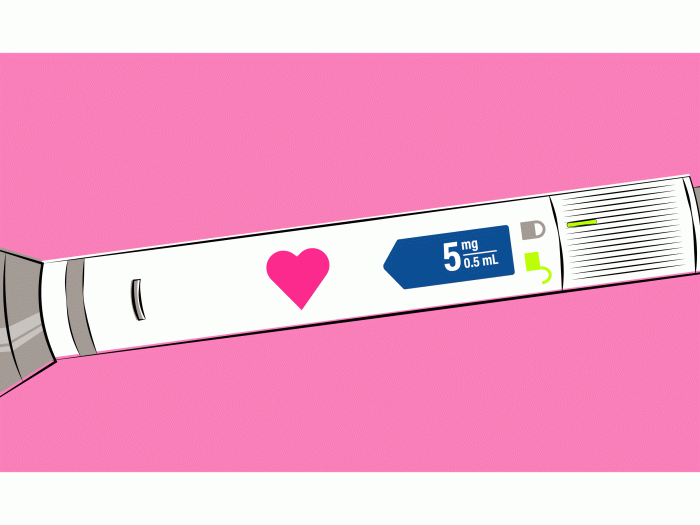A multidisciplinary Michigan Medicine program performs innovative weight-loss treatments using noninvasive techniques. Learn more about the options.
7:00 AM
Author |

Until recently, the only options for combating obesity were lifestyle modification, medications and, if those methods proved ineffective, bariatric surgery.
LISTEN UP: Add the new Michigan Medicine News Break to your Alexa-enabled device, or subscribe to our daily audio updates on iTunes, Google Play and Stitcher.
But many patients don't meet surgical requirements or are unwilling to undergo operations because of anxiety or fear.
To fill the gap between lifestyle interventions and surgery, endoscopic bariatric and metabolic therapies (EBMTs) were created.
The procedures significantly reduce a patient's stomach volume or alter other parts of the digestive tract to treat obesity and other metabolic diseases. Unlike traditional bariatric surgery, an endoscopic bariatric procedure is performed using a small, flexible scope inserted through the patient's mouth.
The same-day outpatient procedures are less invasive — which helps reduce the risk of complications — and can help sustain greater success in keeping the weight off than lifestyle interventions or medications do, says Allison R. Schulman, M.D., MPH, director of bariatric endoscopy at the University of Michigan.
"Obesity is an accelerating epidemic, with a large proportion of patients untreated or inadequately treated," Schulman says. "EBMTs offer patients an effective outpatient option for weight loss when modifications in diet, exercise and pharmacotherapy are not enough.
"These types of minimally invasive procedures have the potential to truly impact the treatment of obesity by expanding the population of treatable patients."
Noninvasive procedures for weight loss
Michigan Medicine is one of only a few centers in the Midwest that has physicians trained to perform bariatric endoscopy.
"We have created a multidisciplinary program in which patients meet with a nutritionist to review dietary requirements before and after their procedures, in addition to a gastrointestinal psychologist to discuss their weight-loss goals and expectations," says Schulman, who leads the effort.
MORE FROM THE LAB: Subscribe to our weekly newsletter
"We also make sure that patients meet with a medical bariatrician and bariatric surgeon to individualize and tailor therapy."
The team may also offer bridge therapy for patients who require weight loss before being considered for other types of surgery, including knee or hip replacements and organ transplants.
These types of minimally invasive procedures have the potential to truly impact the treatment of obesity by expanding the population of treatable patients.Allison R. Schulman, M.D., MPH
Because insurance providers do not always cover these procedures, patients who elect bariatric endoscopy through this program are also referred to a financial counselor to review the costs involved.
Schulman offered a rundown of the innovative outpatient procedures available at Michigan Medicine:
Intragastric balloon therapy
This procedure involves either fluid- or gas-filled balloons and is approved for patients with a body mass index of 30 to 40.
The fluid-filled balloons are placed endoscopically by the guidance of a tiny camera from a patient's mouth into the stomach. Once the balloon has been advanced, a physician uses the camera to accurately position the balloon and fill it with a safe saline solution.
SEE ALSO: Approving Bariatric Surgery at Lower BMI May Improve Patient Outcomes
Through this space-occupying device, the patient's stomach size is decreased, which limits food consumption.
"Overall, this efficient outpatient procedure only takes about 30 minutes," Schulman says. "These balloons seem to work by delaying gastric emptying, which leads to an increase in satiety."
Gas-filled balloons are also available, and up to three are sequentially swallowed by the patient over several weeks before being removed endoscopically. This procedure is also reversible. The balloons are only intended to be left in place for six months before their removal.
Endoscopic sleeve gastroplasty
Similar to a traditional surgical sleeve gastrectomy procedure, in which a physician sutures a patient's stomach to make it smaller, an endoscopic sleeve gastroplasty is performed via an upper endoscopy without an incision.
Instead, a thin tube is inserted in the patient's mouth and then led into the stomach.
"Endoscopic sleeve gastroplasty is an incisionless, minimally invasive approach to clinically meaningful weight loss," Schulman says. "This procedure has a low complication rate and may be an option for sustained weight loss in patients who are not surgical candidates or who do not wish to pursue surgery."
Endoscopic sleeve gastroplasties are intended for patients with a BMI greater than 30. Michigan Medicine's program was the first in the state to perform the procedure.
AspireAssist®
The AspireAssist procedure involves a tube device inserted into a patient's stomach to drain (or aspirate) a portion of its contents after meals. The device is inserted into the stomach with an endoscope through a small incision in the abdomen.
SEE ALSO: Study: Weight Loss Reduces Pain Far Beyond Load-Bearing Joints
A button-shaped port valve connected to the tube device remains outside the body, resting against the skin.
Twenty to 30 minutes after each meal (up to three times a day), the patient is instructed to "open" the button and attach a small hand-held device that facilitates the emptying of stomach contents, which can be immediately discarded.
The process, which takes five to 10 minutes, removes about 30 percent of each meal and is an outpatient procedure intended for adults with a BMI of 35 to 55.
With consistent medical monitoring by a physician and team of experts, aspiration therapy offers a long-term option for weight loss.

Explore a variety of health care news & stories by visiting the Health Lab home page for more articles.

Department of Communication at Michigan Medicine
Want top health & research news weekly? Sign up for Health Lab’s newsletters today!





